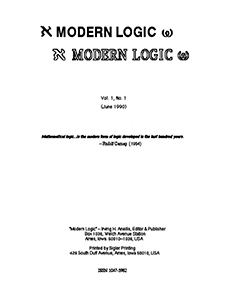Abstract
At the end of his life Ernst Schröder (1841-1902) regarded the formulation of a general theory of operations as his "very own field of research." Already in his Lehrbuch der Arithmetik und Algebra (1873) and especially in Über die formalen Elemente der absoluten Algebra (1874) he had made the first steps towards establishing a "formal" or, in its final stage, an "absolute algebra" proceeding from the assumption that there are operations which allow to connect two objects of a given domain (not restricted to mathematical objects) to a third, which belongs also to the domain. By this means Schröder tried to go beyond the narrow boundaries of traditional arithmetic, and to embrace also non-commutative numbers like quaternions. Through Robert Grassmann's Formenlehre (1872), Schröder discovered the analogy between arithmetical and logical connectives, but already late in 1874 he went further: he then treated formal logic and arithmetic as two different models of formal algebra. His subsequent research was devoted to the analysis of logic as such a model. Schröder considered his proof that the "second subsumption of the distributive law" was not provable in the identical calculus without negation as one of the main results of his Vorlesungen über die Algebra der Logik (vol. I, 1890). As a conclusion from this proof, he distinguished between a "really logical calculus" (of groups, algorithms etc.) without complete distributivity, and the identical calculus which had to contain a special postulate to provide the problematic second subsumption. When Schröder studied Peirce's algebra of relatives in the beginning 1890s, the focal point of his research returned to his early program of an absolute algebra. The logic of relatives with its relative operations following the laws of the absolute algebra seemed to provide the language for applying the intended general theory of operations to all fields of mathematics and, beyond this, to all fields of knowledge containing formal structures. In this modified conception Schröder regarded arithmetic as part of a "general logic".
Citation
Volker Peckhaus. "Wozu Algebra der Logik? Ernst Schröders Suche nach einer universalen Theorie der Verknüpfungen." Mod. Log. 4 (4) 357 - 381, October 1994.
Information




